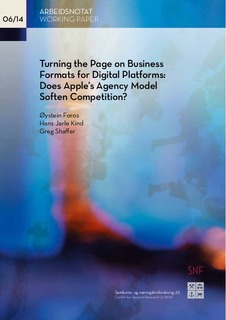| dc.contributor.author | Foros, Øystein | |
| dc.contributor.author | Kind, Hans Jarle | |
| dc.contributor.author | Shaffer, Greg | |
| dc.date.accessioned | 2014-05-14T09:55:00Z | |
| dc.date.available | 2014-05-14T09:55:00Z | |
| dc.date.issued | 2014-04 | |
| dc.identifier.issn | 1503-2140 | |
| dc.identifier.uri | http://hdl.handle.net/11250/194997 | |
| dc.description.abstract | The agency model used by Apple and other platform providers such as
Google allows upstream rms (content providers like book publishers and developers
of apps) to choose the retail prices of their products (RPM) subject to a xed
revenue-sharing rule. We show that (i) this leads to higher prices if the competitive
pressure is higher downstream than upstream; (ii) upstream rms earn positive
surplus even when platform providers have all the bargaining power; and (iii) with
asymmetric business formats (where only some platform providers use the agency
model), a retail most-favored-nation clause leads to retail prices that resemble the
outcome under industry-wide RPM. | nb_NO |
| dc.language.iso | eng | nb_NO |
| dc.publisher | SNF | nb_NO |
| dc.relation.ispartofseries | Working paper;06/14 | |
| dc.subject | VDP::Samfunnsvitenskap: 200::Økonomi: 210::Samfunnsøkonomi: 212 | nb_NO |
| dc.subject | the agency model | nb_NO |
| dc.subject | resale price maintance | nb_NO |
| dc.subject | most-favored nation clauses | nb_NO |
| dc.subject | revenue sharing | nb_NO |
| dc.title | Turning the page on business formats for digital platforms : does Apple's agency model soften competition? | nb_NO |
| dc.type | Working paper | nb_NO |
